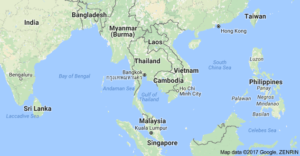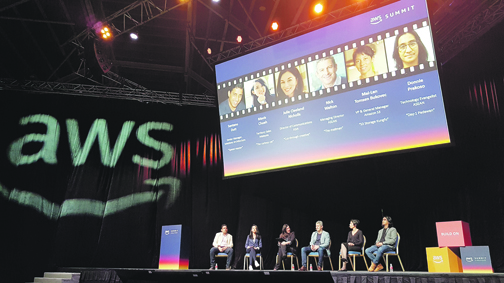ASEAN 2018 BIZ-TECH: SINGAPORE – The rise of Asean digital companies
The rise of Asean digital companies
Grab’s acquisition of the Southeast Asian business of California-based ridesharing services provider Uber highlighted the emergence of Asean digital companies with global aspirations.
“The spirit of entrepreneurship and innovation is very strong in Southeast Asia,” says Mai-Lan Tomsen Bukovec, vice president and general manager of Amazon S3, Amazon Web Services’ object storage service.
Bukovec is the keynote speaker during the AWS Summit 2018 on April 4 where 10,000 participants, including 6,000 who trooped to Singapore Expo and 4,000 who tuned in to the livestream event, learned more about the latest technologies such as the cloud, digital transformation, artificial intelligence, machine learning and deep learning.
“There is digital transformation happening all over the world. It is all based for the most part on AWS. Right here in Asia, we have many different enterprises that are working on this journey of digital transformation,” says Bukovec.
AWS, the cloud-computing arm of Amazon.com, encourages companies to shift from on-premise IT infrastructure in the form of expensive servers and adopt its cloud solutions. It offers more than 130 services to startups and companies, including computing, storage, database, networking and application development as well as the latest solutions on analytics, Internet of Things, artificial intelligence, voice recognition, image recognition, machine learning and virtual and augmented reality.
AWS, which launched its first storage service called S3 in 2006, is the fastest technology company in history to hit $10 billion in annual run rate. “Today, AWS is a $20-billion run rate business, growing at 45 percent year-on-year. We have millions of active customers on the platform every single month. In the last two years, we opened offices in the Philippines, Malaysia, Thailand, Vietnam and most recently Indonesia. We are putting teams in place to work with customers and partners to benefit from AWS. We see this record adoption of the Internet in Asean. We have more than four million net new users that are joining and connecting to the Internet every single month,” says Nick Walton, managing director of AWS in Asean.
Asean, a group of 10 Southeast Asian countries with a combined population of over 600 million, is now home to several unicorns or highly successful digital companies such as Grab, Iflix, Lazada, Go Jek, Traveloka and Tokopedia which are also AWS clients.
“There are new companies that are evolving from day one. We have seen a lot of interesting, large startups across the region. Everyone is talking about—Go Jek, Grab, Traveloka, Tokopedia and so on, but what is interesting I think is the next batch of startups that are coming through,” says Walton.
“They are not in the scale that big unicorns are. But we heard about Hellodoc which is a startup from Indonesia providing health services through their platform. We know companies like Shoppr in Malaysia who are using AWS to analyze 10 million images a day, helping provide fashion advice,” he says.
Unicorns
“I expect that in a couple years time, there should be another 15 to 20 unicorns in Southeast Asia. What we focus on in AWS is working with startups, both big and small, and helping set them up to be successful,” says Walton.
Walton says there is also a good set of startups coming from the Philippines. “Coins.ph is the obvious one that is a real standout. But again, there is another batch of startups that are off the radar at the moment, but have good ideas—real smart, good entrepreneurs, ambitious entrepreneurs who run on AWS. Not all of them will be successful, but some will which is exciting,” says Walton.
Greg Meehan, partner and vice president for sales of Supahands, says AWS enables their Kuala Lumpur-based company to reach out to remote employees and clients. “Supahands is a platform that connects large remote elastic workforce across Southeast Asia to businesses globally. It can scale out and scale back in, depending on our clients’ demand. We call our remote workers super agents. We have 2,000 super agents working on the platform primarily located in Malaysia, Indonesia and the Philippines as well,” Meehan says.
“We started in 2014. Originally, we were a virtual assistant app. After a couple of years in 2016, the company realized that there were larger requests that were coming through and more frequently. From there, we have grown to work with large multinationals in Malaysia, Singapore, across the world actually. The way we use AWS is it is completely scaleable. You only pay for what you actually use,” says Meehan.
Ricky Dagelet, chief executive of Manila-based E-Science, says AWS also supports the operations of their company. “We are an innovation company specialized in mobile technologies. We were founded in 2000. So it is almost our 19th year. Right now, we are specializing in mobile solutions for enterprise market. It is ideal for companies who have mobile field force, with big sales organizations, companies with a lot of field representatives that collect data from the field,” says Dagelet. E-Science plans to expand to other Southeast Asian countries.
Walton says aside from startups, large traditional companies also take on the journey of digital transformation. “All companies need to become increasingly digital. This is what we have seen in the transformation of large enterprises. We need to be competitive. We need to serve better, because our customers expectation increase,” he says.
“Companies like Globe Telecom definitely get that and understand that customer expectations continue to increase. That is why Globe uses AWS to drive innovation and to deliver new services to their mobile customers and drive loyalty and new customer growth,” says Walton.
Santanu Dutt, head of solutions architecture of AWS for Malaysia and the Philippines, says Southeast Asia is a big market for AWS. “We had startups like Grab and Supahands of Malaysia, Coins.ph of the Philippines and other startups adopting us for their digital journey. But in the last few years, we have also seen a lot of large enterprises adopting us for agility and innovation,” he says.
“Singapore Airlines is using us for digital transformation. AirAsia handles 10 million customers to 40 million customers every week. Petronas is running their system on us. Globe in the Philippines runs 50 percent of their workloads on AWS platform. It has been a very good market for us, and that is why we have invested a lot in terms of resources,” Dutt says.
Disruptor
“AWS has leveled the playing field. If you look at 15 years ago, to start a platform and be a global disruptor, you would need a lot of cash and capital investment to have a global presence. Today, what you need to do is pick up a button and start up your own server and go on from there across the 100 plus services that are available to startups. That sort of levels the playing field because they have access to the same APIs [application programming interface], the same platform that global players have. In a sense, our platform is democratizing access to high-end technology, from small startups to largest players equally,” says Dutt.
AWS encourages all companies in the region, including the largest banks, to bring their legacy applications from servers or data centers located in their own offices to the cloud and adopt the latest technologies to cut cost, boost productivity of employees, capture the target market more efficiently and serve customers better. Dutt says DBS, one of the largest banks in Asean, is already embracing the cloud.
Bukovec says that with the help of AWS, “the stock exchange in Thailand built a whole new online trading platform that handles a hundred thousand users at its peak and they did it in eight months.”
She says in Indonesia, Kumparan, the country’s first hybrid media platform, takes professional journalism and combines it with user-generated content to deliver millions of reads to customers.
In Singapore, Challenger, a consumer electronics retail chain, uses the AWS platform to bring together over 38 physical retail stores with Hachi.tech, their online e-commerce site, she says.
Singapore Airlines, one of the world’s most awarded airline companies, is in the middle of digital transformation on AWS platform, according to Bukovec.
George Wang, senior vice president for IT at Singapore Airlines, confirms this, saying digital transformation “requires a concerted effort across the company from top management all the way to frontline staff.”
“We need to reimagine the customer journey, the way we sell to customer, the way we serve the customer, the way we offer it and the way we enable our employees,” Wang says. “From all these services and innovations with AWS, we are able to achieve 16 times faster than before. We have also reduced the footprint of our data center to one quarter of its original size mainly due to our strategy of going to cloud.”
Partners
AWS recently recognized its outstanding partners in Asean, including Accenture which received the Partner of the Year – Consulting Partner award for its work in Malaysia, Indonesia and the Philippines; Malaysia’s GoQuo as the Partner of the Year-Technology Partner for building solutions for customers across Asean on advanced AWS services; Singapore’s 1CloudStar as the Specialized Partner for providing critical solutions built on the AWS cloud for customers across Asean; Singapore’s Source Pte Ltd. as Rising Star Partner for ramping up on their local capabilities and capacity; and Thailand’s DailiTech as Innovation Partner for the innovative use of AWS services to create solutions for customers, using advanced machine learning technologies like Amazon SageMaker and Amazon Lex.
Other Asean clients now using AWS cloud solutions include Singtel, MediaCorp, Ayala Land, PayMaya, Globe Telecom, Sunday Insurance, Halodoc, Bhineka, Momo, Link, Central Technology Organization, Carmudi, Knorex, Eatigo and FinAccel.

Craig Stires, head of analytics, big data and AI of AWS in Asia-Pacific, says companies need to keep up with the rapid pace of technology advancement.
“If you look back three years ago, this idea of self-driving cars seemed kinda far-fetched. There was a lot of uncertainty around it. What we are seeing is that there has been a lot of progress. Companies are moving faster and faster. The idea of drones delivering products, five years ago, sounded like science fiction. That is now a real thing, as we have Amazon Prime Air and deliveries happen across the UK. These things that seemed kinda far-fetched or seemed like science fiction are now happening,” he says.
Stires, a data analyst who helped the Bureau of Internal Revenue in the Philippines develop a system to track tax evaders, says AWS helps companies, both big and small, to have an equal access to the latest technologies.
“Very small companies, organizations that have two or three people with great idea have access to the same kind of technologies that are available to the very high end. All of these technologies that we built over 20 years, we have released those as commercial offerings, so that every developer, whatever their skill sets, could have access to the very high end of the AI,” says Stires who also worked as a dive instructor in Palawan several years back.
Bukovec says she expects more startups and companies in Asean to become successful on the global stage. “I can’t wait to see what the builders of Southeast Asia will do next. And AWS will be with you every step of the way,” she says. / posted April 07, 2018 at 07:30 pm by Roderick T. dela Cruz /


NOTE : All photographs, news, editorials, opinions, information, data, others have been taken from the Internet ..aseanews.net |









